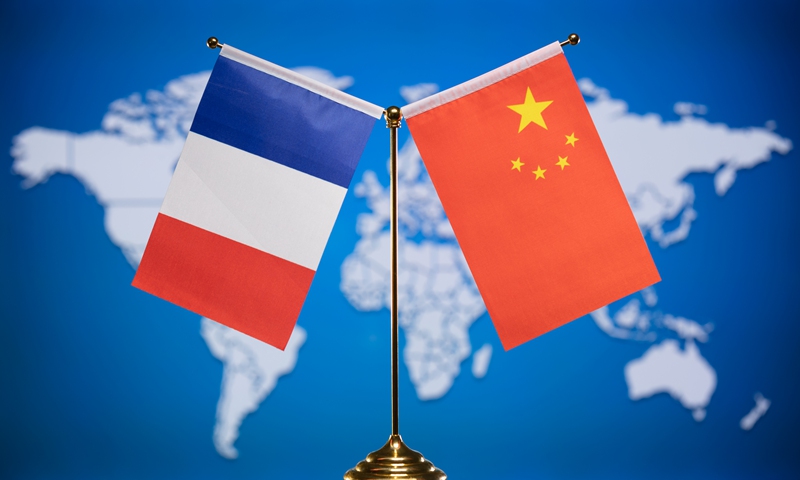Beijing welcomes clarification on ‘de-risking,’ hopes Paris to be stabilizer for EU ties
French Finance Minister Bruno Le Maire said on Sunday that he opposes the “illusion” of countries “decoupling” from China and he does not believe the world’s second-largest economy constitutes a risk.
He made the remarks after China and France concluded the 9th China-France High Level Economic and Financial Dialogue in Beijing on Saturday as part of high-level talks between the two countries that had resumed following the meeting between the two heads of state in April.
The two countries reached a series of consensus ranging from finance to climate change and aerospace, which constitute “an encouraging sign” that China and France are enhancing economic cooperation and underscored the substantial mutual needs, analysts said.
While China hopes France can be the “stabilizer” of EU-China relations, EU’s ongoing debate on “de-risking” could limit the scope and scale of China-France cooperation, some experts said, citing as negative factors the transatlantic partnership, EU’s inaccurate understanding of China-Russia relations and ideological divergences between China and the EU.
Although the China-EU relations have been more stable with more dialogues and exchanges being resumed in the first half of 2023, experts called for more efforts to maintain the current momentum and yield more fruitful cooperation results as the lack of cooperation would be “the biggest risk.”
Fruitful results
Chinese Vice Premier He Lifeng on Saturday co-chaired the 9th China-France High Level Economic and Financial Dialogue in Beijing with France’s Minister of Economy, Finance and Industrial and Digital Sovereignty Le Maire.
Under the strategic guidance of the two heads of state, China-France economic and trade relations have shown great resilience and sound momentum of development. China stands ready to further strengthen policy communication with France, deepen practical cooperation, step up coordination on international and multilateral affairs, and push the China-France comprehensive strategic partnership to a new high, He said.
Le Maire said Chinese investors are welcome in France, especially in the field of electric vehicles, batteries and energy transition, citing an example of Chinese group XTC New Energy Materials that has invested with French nuclear giant Orano in batteries, French newspaper Les Echos reported. Le Maire’s remarks come as several Western countries, including Germany, have claimed they want to reduce economic dependence on China, the French media said.
Le Maire told a press conference on Sunday that France wants to get better access to Chinese markets. To have a balanced trade relationship with China, France needs to export more goods to China, Reuters cited the official as saying.
France is on the right track, Le Maire said, opposing the “illusion” of countries “decoupling” from China.
At the press conference, Le Maire also clarified the concept of “de-risking,” popular in recent months among many Western countries, noting it “does not mean China constitutes a risk,” wishing to “avoid any misunderstanding,” French media BFMTV reported.
“In implementing the consensus reached by the heads of state, all the China-France, China-EU dialogue and cooperation mechanism are expected to resume this year. The latest China-France dialogue is very meaningful, as it shows that the two countries share significant mutual needs in economy and trade,” Cui Hongjian, director of the Department of European Studies at the China Institute of International Studies, told the Global Times on Sunday.
Against the backdrop of the US’ “decoupling” push in the name of “de-risking,” the latest high-level dialogue between China and France is significant in countering the anti-globalization waves initiated by the US hawks and further consolidating the economic and trade cooperation among China, France and other EU member states, Chen Jia, an independent analyst on international strategy, told the Global Times on Sunday.
“The China-France meeting was fruitful and the outcomes are wide-ranging, covering industrial chains, financial services to digital economy and intellectual property protection. Particularly in the field of digital economy, it emphasizes continuing to handle applications [for market access] from Chinese-funded enterprises in a fair, non-discriminatory manner based on laws and regulations, including those on national security,” Chen said.
Obstacles remain
Although the overall atmosphere of China-EU bilateral economic and trade relations is under heavy influence of the US and its “de-risking” rhetoric, some experts said that “the temperature” of China-EU economic and trade relations, seen through statistics, has been heating up rather than cooling down in recent years.
Germany’s direct investment flows to China are estimated to have increased by 11 percent in 2022, similar to the increase in 2021, but much stronger than in previous years between 2016 and 2020, German Economic Institute IW told Reuters in May.
“With a strong awareness of strategic autonomy and willingness to lead the EU, France also hopes to strike a balance between the EU and the US while its strategic autonomy could help it achieve some positive results in China-France trade relationship,” Gao Jian, a scholar from Shanghai International Studies University, told the Global Times on Sunday.
However, as a member state of the EU, France faces some restrictions from the overall China-EU relations – some negative factors such as enhanced transatlantic partnership amid the Ukraine crisis and the EU-level regulations could pose more obstacles to the France-China cooperation, Gao said.
French President Emmanuel Macron’s top diplomatic adviser Emmanuel Bonne recently said China was delivering items that could be used as military equipment to Russia, although not on a massive scale. Later, as a response, the Chinese Foreign Ministry noted that on the issue of arms exports, China has always adopted a cautious and responsible attitude, strictly adhering to domestic policies and laws, as well as the international obligations China has undertaken.
There is a trend in Europe of linking the EU-China relations with China-Russia relations and hyping related issues to exert pressure on China. Some still have an inaccurate understanding of China-Russia ties, Cui said. “Such hypes should be prevented from becoming a new problem in the China-EU relations.”
“The China-EU relations have entered a stabilizing track after the resumption of dialogue and exchanges that have helped improve mutual understanding, and both sides need to achieve more cooperation results to help stabilize the relations in a longer term,” Cui said.
(Global Times)




